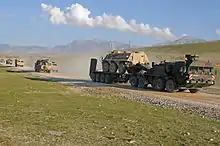Joint Support and Enabling Command
The Joint Support Enabling Command (JSEC) is a joint operational level command under the NATO Military Command Structure. The command is designed to facilitate the rapid movement of forces across national borders in Europe.[1][2] According to NATO spokesperson Oana Lungescu, "The new command in Ulm will help our forces become more mobile and enable rapid reinforcement within the Alliance, ensuring we have the right forces in the right place at the right time".[3] It is under the operational command of Supreme Allied Commander Europe (SACEUR).[4]
| Joint Support and Enabling Command | |
|---|---|
 Coat of arms | |
| Active | 2018–present |
| Allegiance | |
| Type | Support command |
| Role | Enablement, reinforcement and sustainment of military forces |
| Size | ≈ 200 personnel |
| Part of | Allied Command Operations |
| Headquarters | Ulm, Baden-Württemberg, Germany |
| Website | jsec |
| Commanders | |
| Commander | Lieutenant General Alexander Sollfrank (German Army) |
| Deputy Commander | Major General Dariusz Ryczkowski (Polish Air Force) |
| Chief of Staff | Major General Antoine Richard Laurijssen (Royal Netherlands Air Force) |
The command is staffed by 160 personnel and extendable to 600 if required. It is located in Ulm, Germany.[3] Another article states it will have around 280 personnel in peacetime and more if a crisis develops.[4] It is commanded by Lieutenant General Jürgen Knappe, who is also jointly Commander Multinational Joint Headquarters Ulm.[5] The command was declared initial operational capable on 20 September 2019.[6]
Background

The JSEC was announced at the same time as Joint Force Command Norfolk, established to help protect maritime transport and sea lines of communication between North America and Europe;[7] Its design is modeled after a Bundeswehr Joint Support Service Command.[8]
The command was designed in light of growing hostilities between European countries and Russia since the annexation of Crimea in 2014 and in response to logistic and bureaucratic hurdles limiting military logistics in case of a crisis.[9] A research paper by the German Federal Academy for Security Policy mentions specific logistical issue such as modernizing diplomatic clearances required for troop movement, loading capacity standards for trucks, ascertaining which roads, tunnels and bridges in Europe can withstand tank and other heavy vehicle's movement.[7][10][11] The German Federal Academy for Security Policy's view is that the forming of JSEC is a possible driver for the establishment of a "Military Schengen".[12]
See also
References
- Mehta, Aaron (2018-02-14). "US, Germany likely home to new NATO commands". Defense News. Retrieved 2020-05-17.
- "New NATO command in Germany will move troops and tanks to hot spots". Stars and Stripes. Retrieved 2020-05-17.
- "New NATO command is designed for rapid movement of troops, vehicles". UPI. Retrieved 2020-05-17.
- Boeke, Sergei (13 January 2020). "Creating a secure and functional rear area : NATO's new JSEC Headquarters". nato.int. NATO. Retrieved 2 October 2020.
JSEC is part of the NATO Force Structure and under the operational command of the Supreme Allied Commander Europe (SACEUR).
- "VITA Joint Support and Enabling Command Commander" (PDF). jsec.nato.int. Joint Support and Enabling Command. 1 October 2020. Retrieved 1 October 2020.
- "NATO'S NEW JOINT SUPPORT AND ENABLING COMMAND DECLARES INITIAL OPERATIONAL CAPABILITY". jsec.nato.int. Retrieved 2020-09-18.
- "NATO confirms two new military commands and agrees a new training mission to Iraq, but burden sharing review fails transparency test | NATO Watch". www.natowatch.org. Retrieved 2020-05-17.
- "A New NATO Command in Germany: Modelled on the Bundeswehr Joint Support Service". Bundesakademie für Sicherheitspolitik. 2018-01-10. Retrieved 2020-05-17.
- Lt.General Schelleis, Martin (April 2018). "Joint Support and Enabling Command (JSEC) and NATO Burdensharing" (PDF). Center for International Security and Governance (CISG) of Bonn University.
- Dr. Davis, Ian. "NATO confirms two new military commands and agrees a new training mission to Iraq, but burden sharing review fails transparency test:A review of the NATO Defence Ministers meeting, Brussels, 14-15 February 2018" (PDF). NATO Watch.
- "NATO: READY FOR THE FUTUREAdapting the Alliance (2018-2019)" (PDF). NATO Official research and policy.
- Philip, Lange (October 2018). "A New NATO Command in Germany Modelled on the Bundeswehr Joint Support Service" (PDF). German Federal Academy for Security, Policy Security Policy Working Paper No. 10/2018.